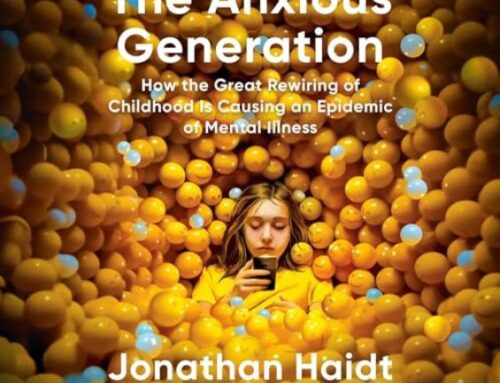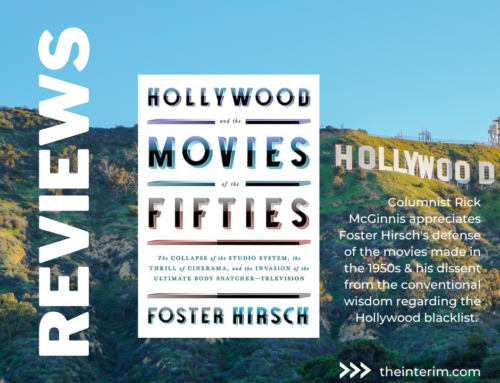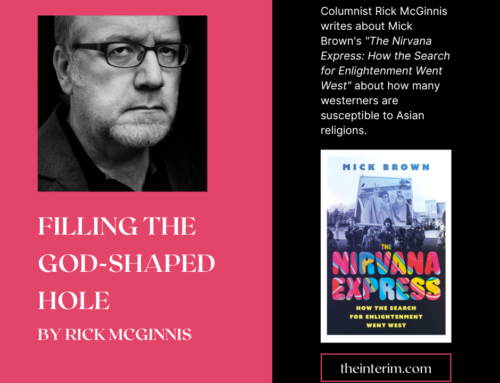
Interim writer, Rick McGinnis, Amusements
Rick McGinnis:
Ten years ago, journalist Leah McLaren wrote something that would come back to haunt her: “I have a secret to tell you: The best confessional writing isn’t the truth.” The first sentence of an article published in Chatelaine magazine, it was a reflection back on a career writing about herself and her experiences for magazines and national newspapers, starting as a young woman in her 20s.
“This is not to say that authors of memoirs are outright fabulists. Most of us do not make stuff up in the manner of James Frey and his million little lies,” McLaren continued, referring to a recent scandal involving an author who had fabricated sections of two bestselling personal memoirs. “But what most skilled memoirists will admit, usually late at night and after a glass or two of whisky, is that the semblance of honesty is much more important than the veracity of honesty in their chosen craft.”
The implications of this statement would play out last year, when McLaren published Where You End and I Begin, a memoir about her relationship with her mother, which began with a story about a dismal incident that happened when she was in her first year of high school. Describing it in an article she wrote for the Toronto Star to publicize the book, McLaren recalled how she “chased a bottle of schnapps with a tab of acid and ended up in a three-way with my close friend and a guy I’ll call Scott.”
“I promise you it was a lot less fun than it sounds,” McLaren wrote.
Her tone was breezy if a bit forced, but it was an accurate enough summary of the incident, which would have simply blended in with many others in the book if the “close friend” hadn’t published her own response to McLaren’s story.
Last December, Zoe Charlotte Greenberg created a blog to write that, the summer she turned 16, “I was sexually assaulted by two of my friends. I was drunk. I was crying. I was barely conscious, on my back by the side of a pool. I didn’t want it. They both sexually assaulted me. He did, then she did.”
Afterward the boy stopped speaking to her and she stopped speaking to her friend, and eventually left the school. She spent years trying to deal with the pain and humiliation of the incident, and had avoided speaking about it publicly “until Leah McLaren, the woman who sexually assaulted me when we were teenagers, published a memoir where she depicted their attack on me as consensual.”
When McLaren began work on her memoir, she had anticipated that the biggest conflict would be with her mother, journalist Cecily Ross, with whom she had shared a relationship that alternated between unusual closeness – for years people had remarked that they were more like best friends than mother and daughter – and an unsurprising friction borne of competition and a lack of boundaries.
In her book, the teenaged McLaren is told by her friend Joni – the pseudonym she gives Greenberg to conceal her identity – about “enmeshment,” which she describes as “basically a nonviolent form of child abuse.”
“The clinical term is ‘emotional incest,’” Joni tells her friend. “It’s pretty common among children of divorce.”
For the rest her memoir, this is the key to understanding her relationship with her mother, in McLaren’s eyes at least. Making us understand it requires sharing details about their lives – her parents’ divorce, McLaren moving in with her mother during high school, their increasingly fractious relationship over subsequent decades, and the conflict over McLaren’s intention to write a memoir.
She describes that relationship early on in the book as her “own private existentialist vision of hell: Cecily and me, sardined on narrow beige beds, reading paperbacks under matching polyblend bedspreads. The air crackling with silent mutual resentment. Close-lipped smiles concealing the poison pooling in our mouths.”
In the interest of full disclosure, I should note that while McLaren and I share mutual acquaintances, I do not know her personally. Her mother, however, was briefly my editor when I freelanced for the Globe & Mail in the 1990s, and though I doubt that she’d remember me, I do remember her as a competent and pleasant editor, albeit one who seemed a bit anxious and distracted.
At the time it seemed like a natural reaction to working in the Globe’s newsroom, one of the most toxic places I had ever visited, though reading her daughter’s memoir has made me privy after the fact to a lot of painful emotional context outside her workplace – information that I didn’t need or want to know.
McLaren describes herself as “another writer in a family of writers,” and at the heart of her conflict with her mother is ownership of their story. The first salvo is fired by Cecily in 2007, when she writes a story for Chatelaine where she states that, for her, “motherhood felt like an affliction.” She continued: “Why does the love I feel for my children feel like a prison? How can I reconcile my desire to lay down my life for them with a simultaneous impulse to run for my life? This is the impossible ambivalence of motherhood.”
While I know that many parents have similar thoughts in times of doubt and stress, it’s probably good for society that most of them keep these thoughts to themselves, and in any case lack the talent, means, and even inclination to publish these thoughts. And it’s not surprising that, in a relationship fraught with competition and simmering disputes over who controls the narrative, Cecily’s article might one day inspire her daughter to say, essentially, “hold my beer.”
The biggest prize in this conflict, at least as McLaren has us understand it, is the story of “the Horseman,” the married, middle-aged father of four who was Cecily’s riding instructor, and who raped her at the age of 12. When her mother tells her the story of the Horseman after McLaren confesses to her mother about her “druggy threesome,” it’s not surprising that the identity of the Horseman, and the long-term repercussions of his violation of her mother, becomes so valuable to Leah, who like any unhappy teenager is desperate for a way to explain why her life is the way it is – and for someone to blame.
While she’s working on her book, Cecily surprises Leah again by writing an article in the Literary Review of Canada telling the story of the Horseman, naming him and anticipating her daughter’s “appropriation” of that story. “I feel my daughters’ pain as though it is my own,” Ross writes. “And I understand the ruthlessness it takes to be a writer. Leah has every right to tell her story. But I will say this as directly and vigorously as I can: this story, this one, is mine.”
In McLaren’s memoir another older man plays a big part in her youth – a man simply described as “the Editor,” a prominent, successful, and married colleague of her mother, for whom young Leah works as a babysitter. The Editor takes an inappropriate interest in her while driving her home, but waits until she’s in college before initiating a brief affair, inviting the much younger woman to spend a weekend with him in in a New York hotel while he’s attending a press junket.
When he learns that she’s working on her memoir, the Editor contacts McLaren to inquire if he’s in it; “as a courtesy,” McLaren writes in a post on her Substack blog, “I sent him some draft pages.” He fact-checks her account but objects to being too identifiable, worrying about the effect it will have on his reputation. “I pointed out that he was retired with a pension in his 70s,” McLaren writes. “His wife already knew, because he’d told her, along with half of Toronto, years earlier – back when shagging the babysitter who later becomes a columnist was still a good look for a man. His wife, to her immense credit, didn’t hold it against me (we’re also friends on Facebook) nor, apparently, did she hold it against him. The affair had been consensual and I’d been of age. I pointed all this out. He said that wasn’t the point.”
McLaren dismisses his concerns about being cancelled, congratulates him on the birth of his grandchild, and suggests that “when the time comes, he might advise his son to call the babysitter an Uber.” McLaren writes: “Like my mother, the editor is welcome to his version of our story. But it does not preclude me from telling mine. The truth is complicated; stories intersect and conflict. We need to accept this. Anything else is a lie.”
It must have felt like a pithy comeback until Zoe Charlotte Greenberg published her account of what she remembered as rape, not a “druggy threesome.” McLaren’s recounting of her life is as polished as you’d expect from a seasoned writer; Greenberg’s is far more raw: “I work hard not to dissociate. I want to be present in my life. I practice mindful self-compassion to stay whole, to move my attention away from the choices these people are making into my own sense of self-worth: I know I am able to love and be loved . . . I draw a lot of sustenance from the hope that I can one day help others as a psychologist. I’m a full-time student. I’m a writer. Also: I’m a mother to a school-age child. I will do whatever I can to stay healthy.”
She says that McLaren had also shared manuscript pages with her before publication, but that her objections to being included were overlooked and that, after a point, her attempts to communicate with the writer and her publisher were ignored. Her post prompted an outcry so negative that filmmaker Sarah Polley, who had written a positive blurb for the book, publicly withdrew her praise and the publisher, Penguin Random House Canada, said in a statement that “we will use this moment to reflect on our own internal processes.”
In her book, McLaren writes about a pre-COVID reunion with her best friends from high school, at a private campsite in the Gatineaus. She describes the now-adult Joni as “a licensed reiki energy healer married to a Swedish actuary,” and in her story has her concoct a body scrub from coffee grounds, rose water and olive oil.
The three middle-aged women swim naked and cover themselves with the body scrub and McLaren describes a touching, tearful, poignant reconciliation. It all seems a bit too perfect, as if McLaren is excusing herself. There is no indication in Greenberg’s account if this happened at all.
On her Substack blog, McLaren takes issue with the whole idea of “appropriation” of stories, with “lesser writers” who complain when theirs are used by better ones, and “scandals involving ludicrously aggrieved aspiring writers who feel their trauma has been appropriated by more successful peers.” She’s careful to differentiate her complaints from the larger debates about “cultural appropriation” – McLaren is too smart to step into that minefield – but there’s something graceless about her undisguised contempt for writers who lack the skills or just the status of more credentialled, recognized ones. Writers like herself; it’s hard to ignore the implication.
McLaren’s career began at a unique moment in Canadian journalism, when the established Globe & Mail was engaged in a war with the upstart National Post. One front of that war was a battle between the “girl columnists” – McLaren at the Globe versus Rebecca Eckler at the Post, a conflict that was imagined more by their editors than the writers, who insist they were always friends.
The two were encouraged to write about their lives, in a last-minute bid to capture younger audiences that were abandoning newspapers. McLaren, only recently an intern at the Globe, describes it as “a blur of stories, meetings, travel, and relationship drama,” much of which she’d share with readers. In retrospect this was the last gasp of the old world of expense account journalism, though McLaren would continue to write about herself.
In 2013 she wrote for Toronto Life about the end of her first marriage, and in 2017 about secretly trying to breastfeed the infant son of a politician at a party – a story that the Globe claimed was accidentally published on their website before it was finished, and which it had to pull in the wake of international media attention, before suspending the writer for a week.
Making the writer the centre of a story goes back to the “New Journalism” of the 60s, though typically it took a generation for it to become an option in Canadian media. Sex and the City was a hit show and a whole generation of young writers (mostly female) were encouraged by their older editors to mine their lives for titillating and controversial subject matter in the print media equivalent of “click bait,” though few have thrived or persisted as long as McLaren.
What no one discussed – at least until now – is if this was ever a good idea, and if, as the tired old saying goes, discretion really is the better part of valour. In a 2018 e-mail conversation published by the Post, McLaren and Eckler reminisced about that time, and McLaren says that “I now often advise young female journalists to think twice before taking on assignments that feel weirdly sexualized or exploitative. The fact is, editors just don’t give those kind of assignments to young men. The one thing I really regret about my early career is that I was much too eager to please.”
The fact is that jobs like McLaren’s and Eckler’s don’t really exist at newspapers anymore, though there are plenty of young people eager to attract attention on the internet, oversharing and exploiting their life for material on vlogs (video blogs) and social media, with their ravenous and fickle audience in the place of those now-retired older editors. Compared to them, McLaren seems like the model of dignity and circumspection – at least until someone else’s story is downgraded to just “their truth” and gets fed into the hopper for content, before a vocal minority of readers decides, finally, that privacy still has value.




